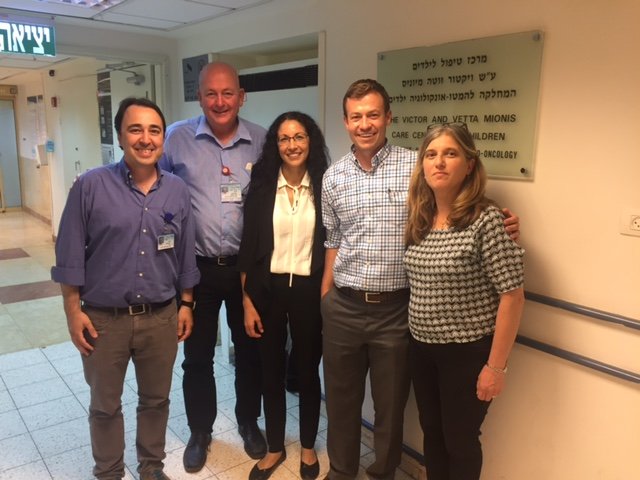We have exciting updates!
The Champ Foundation released a Call For Proposals in November 2016 with proposals due March 1, 2017. We worked with the NIH to publish our call and spent hours cold-calling and cold-emailing any doctor/researcher who had ever published anything about mitochondrial deletion disorders. We ended up with five proposals from institutions around the world.
Our newly created Science Advisory Board reviewed each grant. After discussing the proposals with them in early April, it was clear to us that we needed to fund two projects. The projects’ very real potential to treat/cure Pearson Syndrome made this decision easy for us. Here are details on the two projects:
Project Title: Treatments and models for diseases caused by mitochondrial deletions
Principal Investigators: Michal Minczuk and Payam Gammage
Institution: University of Cambridge
Direct cost: $100,000 over two years
Lay Abstract: Mitochondria are cellular structures that provide energy from food that cells can use. They also contain DNA, called mtDNA. Intact mtDNA is vital for healthy functioning of the cell. Genetic mutations in mtDNA, where a single DNA building block is changed, or a part of mtDNA is deleted, can lead to human diseases, often affecting brain, heart, bone marrow and muscles. There are no treatments for these diseases. Our approach to treatment of mtDNA diseases is to design proteins that can specifically eliminate only the mutated mtDNA, curing patients’ cells. We have already achieved this goal using in vitro models of mtDNA disease. The essential next step in bringing these proteins to the clinic is to test them in the types of cells that are affected in patients (neurons, muscle cells or blood cells) and in a living organism (in vivo). Therefore, in the first part of the proposed research, it is our intention to generate neurons, muscle cells or blood cells from patient skin cells that lack a fragment of mtDNA, into which we will administer therapeutic proteins. We expect that our intervention will improve the function of these cells, providing important pre-clinical data on the safety and efficacy of our approach. In the second part of of our planned research, we intend to develop a DNA-editing tool enabling us to cut out mtDNA fragments at will. Such a tool could be used in the future to produce animals with deleted mtDNA that would develop disease symptoms similar to human patients. These model organisms can be used to further test our therapeutic proteins and other drugs, providing the vital pre-clinical data required to take the next steps towards the use of experimental therapeutic strategies in humans.
Project title: CD34+ cells enriched with blood cells derived healthy mitochondria as a treatment for Pearson Syndrome
Principal Investigators: Amos Toren, Natalie Yivgi Ohana, Elad Jacoby, Ann Saada
Institution: Sheba Medical Center
Direct cost: $130,000 over one year
Lay abstract: A collaboration between hematologists from Sheba Medical Center (Prof. Amos Toren and Dr. Elad Jacoby), mitochondria-scientist from Hadassah-Hebrew University Medical Center (Prof. Ann Saada) and a researcher from a biotechnology company in Israel (Dr. Natalie Yivgi Ohana) has created a scientific research plan to bring a novel therapeutic approach to Pearson Syndrome. The technology, developed by Minovia Therapeutics over the past 6 years, is based on transplantation of normal mitochondria in patient’s stem cells. The patient’s own bone-marrow cells would be carriers of normal mitochondria from a donor (without deletions) and would carry normal mitochondria to other tissues through the blood stream. The group will first conduct animal studies to show the effect of such treatment on mice harboring a mitochondrial DNA mutation and use the results to apply to the FDA for a formal clinical trial.
In order to fund these projects and continuing supporting Dr. Suneet Agarwal’s work at Boston Children’s, we need to raise an additional $80,000 between now and April 2018. With #ChampStrong supporters like you, we know we can do it! We’ve got big fundraising plans that will be announced over the next few weeks! Stay tuned!
We are confident these projects will bring us closer to treatment and a cure for Pearson Syndrome. The enthusiasm of our Science Advisory Board and the qualifications and expertise of the researchers is SO encouraging. We’ve spoken many times with Dr. Minczuk in Cambridge and Jeff traveled to Israel to meet with the team in Tel Aviv (see picture!). We’ve left each interaction feeling more strongly about these projects’ ability to make an enormous difference in the lives of children with mitochondrial deletion disorders in the near term.
It’s days like today that make us feel a little extra proud and a little extra hopeful. Thank you for your continued support.
